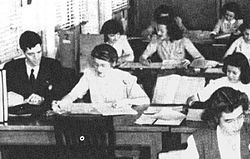- Meredith Gardner
-
This article is about the codebreaker. For the freestyle skier, see Meredith Ann Gardner.
Meredith Knox Gardner Born October 20, 1912
Okolona, MississippiDied August 9, 2002
Chevy Chase, MarylandResidence Washington, D.C. Nationality American Ethnicity Scottish American Education master's degree in languages Alma mater University of Texas
University of WisconsinOccupation linguist, cryptographer Years active retired–1972 Employer National Security Agency and its predecessors Known for decrypted Venona papers, leading to arrest of Julius and Ethel Rosenberg Spouse Blanche Hatfield Gardner Children son, Arthur Hatfield Gardner
daughter, Ann Martin
11 grandchildrenRelatives cousin, Patrick Buchanan Notes Meredith Knox Gardner (October 12 (or 20), 1912–August 9, 2002) was an American linguist and codebreaker, who pulled off one of the greatest U.S. counter-intelligence coups of the 20th century by decoding Soviet intelligence traffic regarding espionage in the United States, in what came to be known as the Venona project.
Early life and career
Gardner was born in Okolona, Mississippi and grew up in Austin, Texas. After graduating from the University of Texas at Austin, he earned a master's degree in German from University of Wisconsin–Madison, where he was a teaching assistant from 1938 to 1940. He was a linguist and professor of German at the University of Akron when the United States Army's Signals Intelligence Service recruited him to work on breaking German codes. Soon after, he started working on the Japanese codes instead, mastering the Japanese language in only a few months.
Venona project
In 1946, Gardner began work on a highly-secret project (later codenamed VENONA) to break the Soviet cryptosystems. The Soviet encryption system involved the use of one-time pads, and thus was thought to be unbreakable. However, the Soviets made the mistake of reusing certain pages of their pads.
Later that same year, Gardner made the first breakthrough on VENONA by identifying the ciphers used for spelling English words. By May 1947 Gardner had read a decrypt that implied the Soviets ran an agent with access to sensitive information from the War Department General Staff, U.S. Army Air Corps Major William Ludwig Ullman. It became apparent to Gardner that he was reading KGB messages showing massive Soviet espionage in the United States.
Gardner retired in 1972, yet his work remained mostly secret until 1996, when the NSA, the CIA, and the Center for Democracy honored Gardner and his colleagues in a formal ceremony that was the result of campaigning by U.S. Senator Daniel Patrick Moynihan.[3] In retirement, he and his wife taught a class in Latin at home, and solved the crossword puzzle in The Times (sent from London by airmail.)
Gardner died on August 9, 2002 in Chevy Chase, Maryland, at the age of 89.
References
- ^ Stout, David (August 18, 2002). "Meredith Gardner, 89, Dies; Broke Code in Rosenberg Case". New York Times. http://www.nytimes.com/2002/08/18/us/meredith-gardner-89-dies-broke-code-in-rosenberg-case.html. Retrieved 2009-04-30. "On December 20, 1946, Mr. Gardner discerned that a message from 1944 had contained a list of the leading scientists on the Manhattan Project, which developed the atomic bomb. More months of toil by Mr. Gardner and his colleagues turned up a reference to an agent code-named Liberal who had a wife named Ethel. ... Despite his pride in having helped to smash an espionage ring, Mr. Gardner was sorry that the Rosenbergs were put to death. Mrs. Gardner said her husband's reasoning was that those people at least believed in what they were doing."
- ^ "Obituaries - Blanche Hatfield GardnerTeacher". Washington Post: p. B06. September 3, 2005. http://www.washingtonpost.com/wp-dyn/content/article/2005/09/02/AR2005090202354_pf.html. Retrieved 2009-04-30.
- ^ Moynihan, Daniel Patrick (July 12, 1999). "MEREDITH GARDNER". Congressional Record (Washington, D.C.: U.S. Senate and Government Printing Office): p. S8293. http://frwebgate.access.gpo.gov/cgi-bin/getpage.cgi?position=all&page=S8293&dbname=1999_record. Retrieved 2009-04-30. "Described by the FBI’s Robert Joseph Lamphere as ‘‘the greatest counter-intelligence tool this country has ever known,’’ Gardner was the National Security Agency’s leading enabler of the reading of thousands of enciphered cables intercepted from Soviet foreign intelligence in the 1940’s. The NSA, under its various names, spent four decades deciphering what Moscow intended to be an unbreakable Soviet cipher. Gardner and his team painstakingly worked on these messages in a project which came to be known eventually as ‘‘VENONA.’’ The resulting VENONA decrypts, which were finally revealed publicly in 1995, detail the Soviet’s espionage efforts in the United States during and after World War II."
- Hall of Honor 2004 Inductee - Meredith Gardner - NSA/CSS Meredith Gardner page at the National Security Agency
- Candice Gaukel Andrews (Winter 2002). "The Code-Breaker and the G-Man". On Wisconsin. Wisconsin Alumni Association. http://waa.uwalumni.com/onwisconsin/winter02/code1.html. Retrieved 2009-05-03.
Categories:- Signals Intelligence Service cryptographers
- Pre-computer cryptographers
- University of Texas at Austin alumni
- University of Wisconsin–Madison alumni
- University of Akron faculty
- People from Chickasaw County, Mississippi
- 1912 births
- 2002 deaths
- University of Wisconsin–Madison faculty
- University of Texas at Austin faculty
- People from Austin, Texas
- Cold War espionage
- National Security Agency cryptographers
Wikimedia Foundation. 2010.

